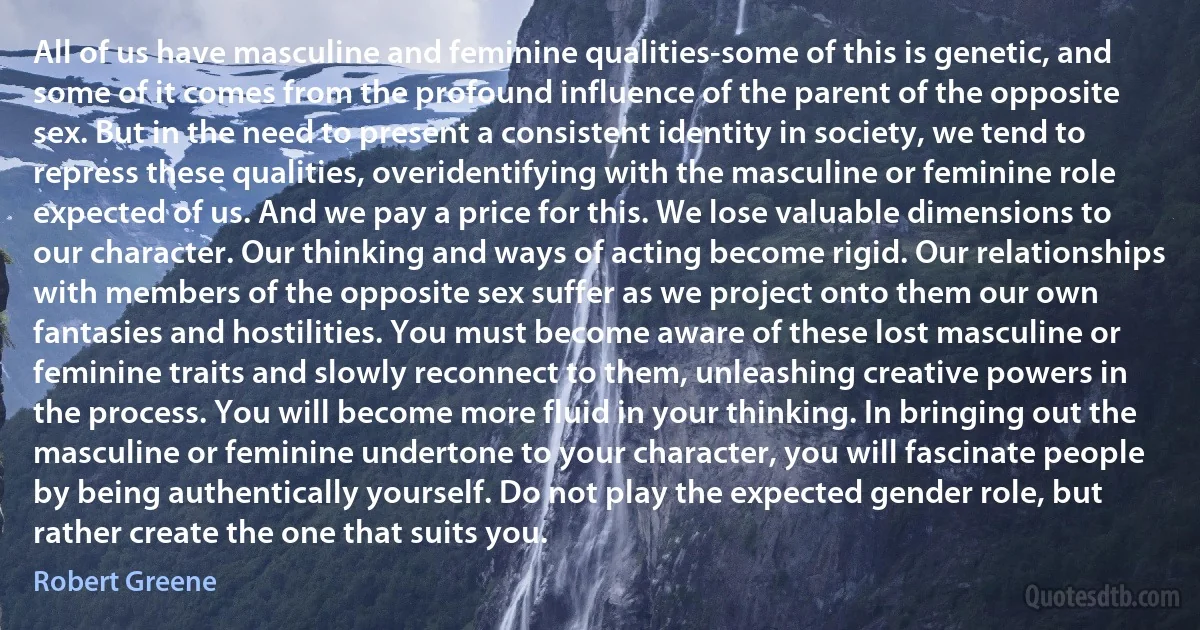
All of us have masculine and feminine qualities-some of this is genetic, and some of it comes from the profound influence of the parent of the opposite sex. But in the need to present a consistent identity in society, we tend to repress these qualities, overidentifying with the masculine or feminine role expected of us. And we pay a price for this. We lose valuable dimensions to our character. Our thinking and ways of acting become rigid. Our relationships with members of the opposite sex suffer as we project onto them our own fantasies and hostilities. You must become aware of these lost masculine or feminine traits and slowly reconnect to them, unleashing creative powers in the process. You will become more fluid in your thinking. In bringing out the masculine or feminine undertone to your character, you will fascinate people by being authentically yourself. Do not play the expected gender role, but rather create the one that suits you.
Robert GreeneRelated topics
character comes creative fluid gender hostilities lose lost need pay people play present project repress rigid thinking undertone valuable waysRelated quotes
This is precisely what is decisive in Nietzsche's conception of art, that he sees it in its essential entirety in terms of the artist; this he does consciously and in explicit opposition to that conception of art which represents it in terms of those who "enjoy” and "experience” it.
That is a guiding principle of Nietzsche's teaching on art: art must be grasped in terms of creators and producers, not recipients. Nietzsche expresses it unequivocally in the following words (WM, 811): "Our aesthetics heretofore has been a woman's aesthetics, inasmuch as only the recipients of art have formulated their experiences of ‘what is beautiful.' In all philosophy to date the artist is missing.” Philosophy of art means "aesthetics” for Nietzsche too-but masculine aesthetics, not feminine aesthetics. The question of art is the question of the artist as the productive, creative one; his experiences of what is beautiful must provide the standard.

Martin Heidegger
It's early in the process for me, but my infatuation with fame is waning, my need for external approval and the control of other people's opinions is expiring. Practically I've decided that profits from this book will go towards creating a place where recovering addicts like me can run a business based on the ideas in this book. A café and production company run to create community, not money, democratically managed by the workforce. No bosses. No profit. No bullshit. Selling food sourced ethically, grown locally, and served by people who have had a Revolution in their own lives and are now able to learn and give back. Supporting modest creative projects, building a community of people who want to be part of something other than the toxic hegemony. We will start small but we will grow quickly because we have a limitless resource and we are providing an alternative to a dying system. There are no limits to what we can achieve if we behave collectively, responsibly, and humanely.

Russell Brand
And so in City after City, street-barricades are piled, and truculent, more or less murderous insurrection begins; populace after populace rises, King after King capitulates or absconds; and from end to end of Europe Democracy has blazed up explosive, much higher, more irresistible and less resisted than ever before; testifying too sadly on what a bottomless volcano, or universal powder-mine of most inflammable mutinous chaotic elements, separated from us by a thin earth-rind, Society with all its arrangements and acquirements everywhere, in the present epoch, rests! The kind of persons who excite or give signal to such revolutions-students, young men of letters, advocates, editors, hot inexperienced enthusiasts, or fierce and justly bankrupt desperadoes, acting everywhere on the discontent of the millions and blowing it into flame,-might give rise to reflections as to the character of our epoch. Never till now did young men, and almost children, take such a command in human affairs.

Thomas Carlyle
In order that woman should reach the same standard as man, she ought, when nearly adult, to be trained to energy and perseverance, and to have her reason and imagination exercised to the highest point; and then she would probably transmit these qualities chiefly to her adult daughters. The whole body of women, however, could not be thus raised, unless during many generations the women who excelled in the above robust virtues were married, and produced offspring in larger numbers than other women. As before remarked with respect to bodily strength, although men do not now fight for the sake of obtaining wives, and this form of selection has passed away, yet they generally have to undergo, during manhood, a severe struggle in order to maintain themselves and their families; and this will tend to keep up or even increase their mental powers, and, as a consequence, the present inequality between the sexes.

Charles Darwin
In the "Alexandrian" explanation described above, the multiple from which evolution emerges is both secondary and sinful from its origin: it represents in fact (an idea that smacks of Manicheanism and the Hindu metaphysical systems) broken and pulverized unity. Starting from a very much more modern and completely different point of view, let us assert, as our original postulate, that, the multiple (that is, non-being, if taken in the pure state) being the only rational form of a creatable (creabile) nothingness, the creative act is comprehensible only as a gradual process of arrangement and unification, which amounts to accepting that to create is to unite. And, indeed, there is nothing to prevent our holding that union creates. To the objection that union presupposes already existing elements, I shall answer that physics has just shown us (in the case of mass) that experientially (and for all the protests of "common sense") the moving object exists only as the product of its motion.

Pierre Teilhard de Chardin
